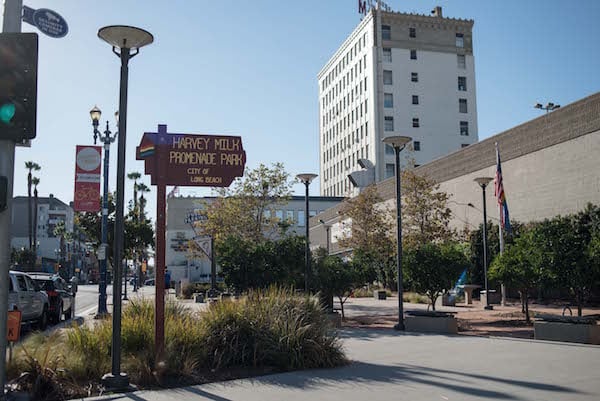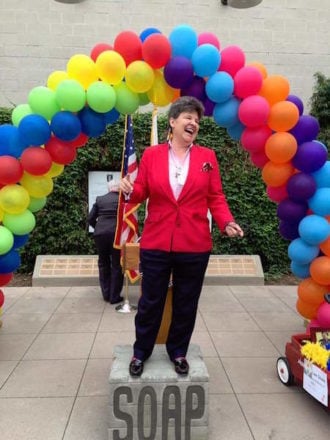
The centerpiece of the Harvey Milk Park is Equality Plaza, which commemorates Milk and includes plaques with the names of local LGBT leaders on the Memorial Wall. The plaza also includes a concrete replica of the famous “Soapbox” Milk stood on to inspire crowds when he spoke, and a 20-foot flagpole flying the gay pride flag. Photo: Trang Le/Q Voice News
LONG BEACH — A queer-art pop-up gallery will be on display tonight at Harvey Milk Park, part of the city’s ongoing efforts to get more people engaged at the public space, which is named after California’s first openly gay elected official.
The event, will take place from 5 to 7:30 p.m., starts with the art show and includes a 6 p.m. discussion about the art economy hosted by the Arts Council for Long Beach.
“My biggest issue with any sort of development or change in the community is how do we identify and engage the current arts and culture of people before we make it new and shining,” said Griselda Suarez, executive director of the Arts Council for Long Beach. “This is a great opportunity to educate visitors, residents and people about Harvey Milk.”
The centerpiece of Harvey Milk Promenade Park is Equality Plaza, which commemorates Milk and local LGBTQ leaders. The plaza includes a concrete replica of Milk’s renowned soapbox, which he stood on to inspire crowds when he spoke; a 20-foot flagpole flying the gay pride flag and a memorial wall with the names of more than 20 local LGBTQ leaders.
RELATED: Nation’s first park named for Harvey Milk
ART DISCUSSION, POP-UP GALLERY
At the art economy discussion, artists and art advocates will learn about professional development and discuss economic innovations.
The pop-up gallery will include paintings, printed photography, and performance pieces that showcase the queer experience, identity, and point-of-view.
All of the artists visit, work, and live in Long Beach.
These artists were selected after the community was invited to an open call and asked to submit work that explores the term queer.

Attorney Stephanie Loftin stands at Harvey Milk Promenade Park on a replica of Milk’s “soapbox” that he used when he spoke in public. Loftin was inducted onto park’s Equality Plaza Memorial Wall in May 2016 for her work in fighting discrimination in the gay community. Photo: Michael Buitron.
The events at Harvey Milk Park and Equality Plaza are part of what the city has called an “Outdoor Collaborative” concept. As more retail, restaurants, businesses and housing open in The Promenade, the city wants the park to play a larger role in the area’s economic development.
In July 2016, the city launched an 18-month process of transforming Harvey Milk Park into an “outdoor office” that encourages collaboration, entrepreneurship and connectivity, as well as celebrates the legacy of Harvey Milk and the LGBTQ community.
ROCKY START
But those efforts had a rocky start.
In April 2016, the city received a $300,000 grant from the John S. and James L. Knight Foundation to create an “outdoor office.” But when the city unveiled the initial renderings at a public celebration, members of the local LGBTQ community who helped the city plan and develop Harvey Milk Promenade Park – were stunned to see all references to the Milk and the LGBTQ community had been erased.
“It was a slap in the face,” said Vanessa Romain, a member of the Harvey Milk Park Selection Committee. “I thought they’re were trying to lock us back in the closet.
City officials, meanwhile, said the rendering was only an initial concept, and the city would reach out to LGBTQ community members for input.
They also emphasized that no LGBTQ elements would be removed from the park.
WON’T BE ERASED
More than a year later, Romain said she’s happy with how the city has improved its communication with the committee.
Apart from inviting committee members to numerous meetings, in December, the city hosted a series of events at the park, where the public and committee members were asked to vote on furniture at the park.
“They apologized to us at the first meeting, and they’ve made an effort to include us in every meeting. That’s good,” Romain said. “I’m not concerned any more that Harvey or the community will be erased.”
